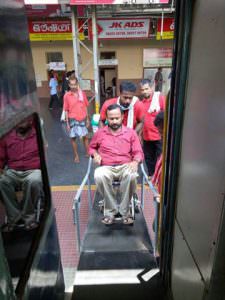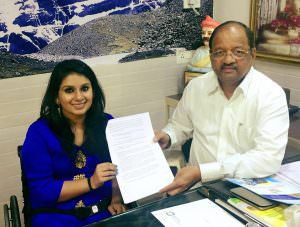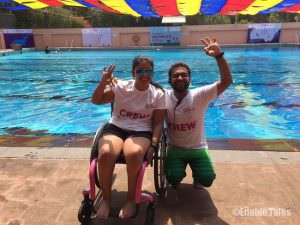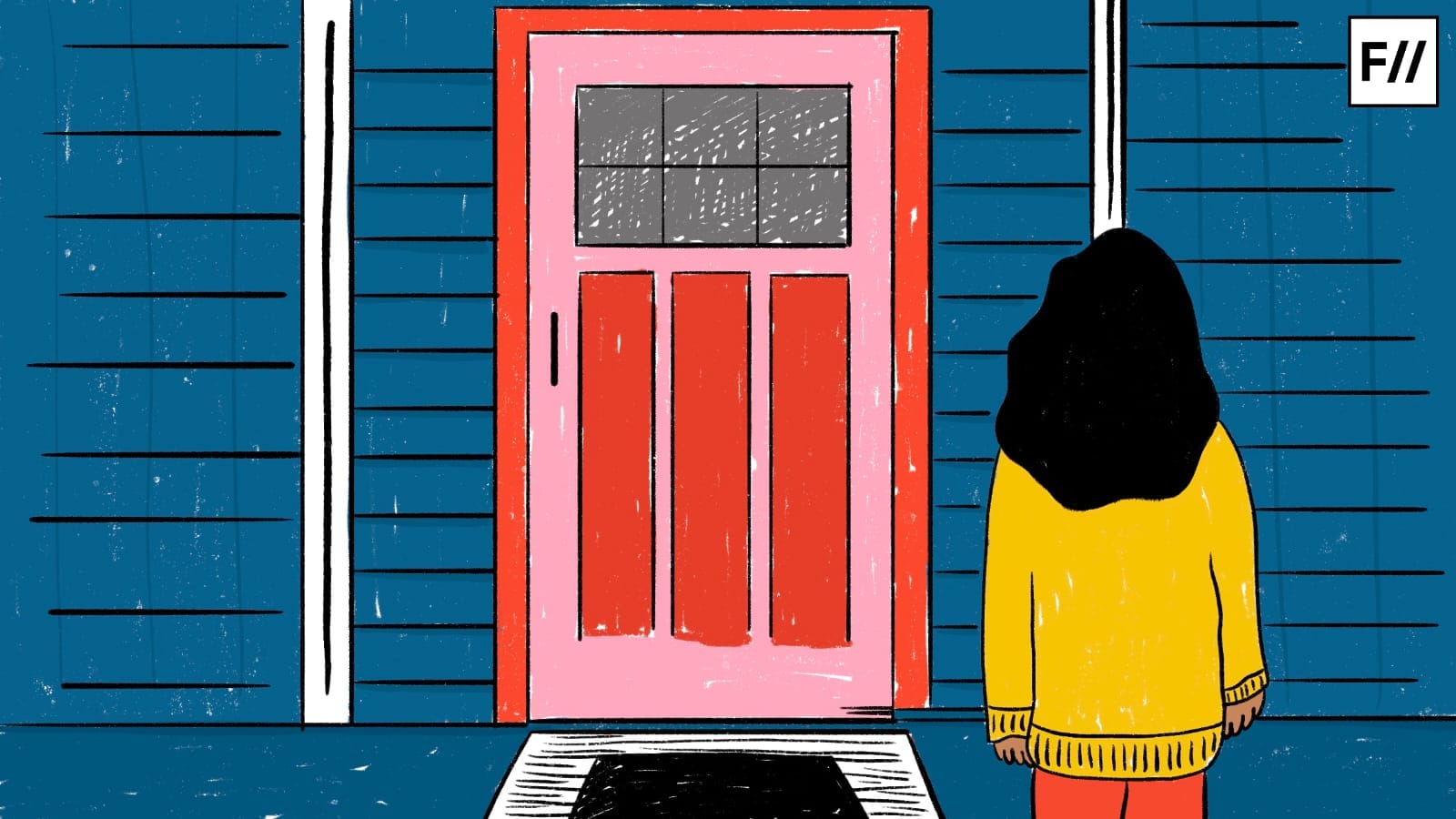I’m sure all of us have heard and talked about our superheroes at some point in our lives. I consciously use the term ‘superhero‘ because the concept of a women being a role model is not something that occasionally comes in our minds. Moving on, even I had the occasional superhero fascination and followed them from time to time. But have you ever thought of your superhero as a person who is in a wheel chair or who is holding a crutch or who is unable to see or speak? No right? Because doing that would be absurd, right?
How can a person who doesn’t function ‘normally‘ be someone’s aspiration of a superhero? That would be weird, right? Unfortunately, that’s what most of us able-bodied people in the society believe. When we think of ‘normal‘ we don’t think of disabilities, because, unfortunately the able bodied are the more visible ones and hence disabilities don’t really matter.
This exact mindset is what has been targeted for change by Virali Modi. If you don’t already know about her, then you are missing out on some really important things in life. Disability rights activist, beauty queen, motivational speaker and adventure sports enthusiast, the list of fields that Virali has championed is growing to be innumerable day-by-day. For Virali, disability is just a part of her life as anything else, but it has not restricted her approach and her vision in life, she’s here to make you believe that superheroes can come in wheelchairs as well!
FII had the lucky opportunity to talk to her and interview her on her work.
M.M: Of all that you have achieved, which one is your favourite feat?

V.M.: My campaign, #MyTrainToo, I feel I achieved a lot, but not enough. A railway official and I have procured aisle sized wheelchairs and portable ramps in Kerala – Trivandrum, Kochi, Chennai, and Ernakulam. Because of that, I feel like I’ve helped many, many people, but I want to do more. I want access for everyone – disability or not, in the railways.
M.M: Can you tell us about your campaign on making the Indian Railways more disabled-friendly?
V.M.: I started my campaign because I read about The Tejas Express, this was in the end of January. I read that they have included many new features and they have the braille for the visually impaired, which I thought was a noble move. But one question kept haunting me – ‘Why aren’t there any facilities for those with physical disabilities?’ I decided to write an open letter to Mr. Prabhu and Mr. Modi about my experiences as a disabled woman, boarding trains. I was molested on three separate occasions by porters, as they tried to ‘help’ me into the train. I got no response from them, despite having many publications, tweeting them, and putting complaints up on their respective websites. That’s when I became angry and started a petition on Change.org. It started getting traction and I received a response from Ms. Maneka Gandhi, but I still haven’t heard anything from Mr. Prabhu or Mr. Modi, which is a shame.
MM: You have received a lot of responses on Quora and Change.org on your campaign. Is there a difference between your perception on the campaign when you started it originally and presently, when you have received so much response?

V.M.: Well definitely there has been a change in my perspective when I started the petition and presently when I have progressed with it. I definitely feel that the government is sympathetic towards people with disabilities. However that said, the policies and the facilities which exist are non-inclusive of the different issues disabled persons go through.There is a general increase in awareness about disability and making the public sphere more disabled-friendly. But I still feel that instead of wasting money on building impressive statues in the middle of the sea, why not channelise those funds to something that is a necessity, implement facilities that are required by 25 million people of the total population of India.
Also Read: Dear Prime Minister, When Will Our Trains Become Accessible For Wheelchair Users?
M.M.: Have you read about the Rights Of Persons With Disabilities Bill, 2016? What are your opinions on it?
V.M.: I haven’t had the time to read the bill when it surfaced in the media, due to some personal reasons. However, I have interacted with different people who have read the bill and are also aware of the laws with respect to disability and the rights of the disabled, and my main concern is access. One of my uncles was telling me how there are no laws which ask private buildings or firms to implement disability friendly measures in their infrastructure.
India has a tendency to copy trends and mannerisms from the western countries, right? We like following the Americans or the British or Australians, then why not follow the laws and the implementation of disability friendly laws from these places into the Indian framework? The problem lies with the fact that corruption has become the backbone of our country and hence even the existing laws and policies are not implemented properly. The government needs to realise that disabled people are also human beings and they also need facilities, instead of driving them off with false hopes.
M.M.: Does the attitude of the government towards the campaign, result in a lot of frustration?
V.M.: Yes of course it does! I have met four officials in Mumbai, two of whom are from the Western and the Central Railways respectively, and the results that have come out of those meetings is zero! At the time of the meeting they sympathise and they tend to say nice things, saying ‘we understand‘ and ‘this is very unique, this has never been done before‘. But after the meeting, even now, presently when I call them for follow ups, their phones are unavailable.
What I’m asking is not much, I’m not asking for the demolition of entire trains and construction of new ones. But what we did in Trivandrum can be implemented in other parts of the country as well. In Trivandrum, the wheelchairs which have been collected and reserved for the assistance of disabled individuals, have been donated by organisations. The ramp which has been arranged, is the only thing that has been invested in by the railway authorities. If the budget for disability friendly equipments and measures is not present, then such small scale measures can be taken immediately, but the government is not willing to take any measures.
M.M.: You’ve shared a lot of incidents where you’ve gone out and people have stared at you. With regard to this, have you noticed any attitudinal shift in people towards disability?
V.M.: People are sympathetic and clearly have sympathy in their eyes, otherwise they’ll say, ‘Oh my god, you’re such a strong girl!‘, just because I’m laughing, smiling, and pushing my wheelchair by myself. I mean, you (as an abled-bodied person) do the same thing too, right? You’re walking, and you laugh and smile – but I don’t come up to you and say, ‘Oh my god, you’re such a strong person! Congrats for walking!’, that’s just hypocrisy. My wheels are my legs right now, so can we please move on from this thinking?
There are also incidents which make me angry, like today just before I got on the call for this interview, I was walking to a mall with my friends, and I was using the sidewalk which is created for persons with disabilities. Just when I was about to walk up the sidewalk, there were two girls on a scooty who brushed past me. I screamed back at them saying, ‘Yeh baap ka road hai kya?‘ (Does this road belong to your father?) and the response I got back was an awkward stare. Able-bodied people are often unable to comprehend that they use the few facilities which are available for disabled people without being sensitive of disabled people using them.
M.M.: When you got sick, you were residing in the US, and during your recovery you moved to India. Could you tell us the attitudinal difference with respect to the US and India?
V.M.: There’s a lot of difference. In the US you don’t really get any particular attention from the public because of your disability. A disabled person is just like any other person. But in India, koi izzat hi nahi dete! (there is no respect at all). They are treated as minorities. Staring and sympathetic words are an everyday thing that I encounter.
Also Read: In Conversation With SexDis On Sexuality, Disability And Accessibility
M.M: What do you feel can be done in order to change this attitude of the Indian society towards disability?
V.M.: When we teach children to become doctors and engineers, we should also make it a point to make them good human beings. When I was in school in the US, we had a class called Special Education, which was a kind of a mannerism class, where you were taught to interact with other people, including people with disabilities. The able-bodied interact with the disabled and there is no segregation based on ability as there is in India.
I feel in India, schools need to teach able-bodied and disabled children together. There should be special educators, but there shouldn’t be segregation based on their abilities. Also, where is the presence of the disabled body in mainstream media? If the media does not show or talk about people with disabilities, then disability cannot be normalised and brought out to the mainstream.
My friends who initially didn’t know how to behave or talk around me, have completely changed, I told them just behave like you used to, I’m the same person, I just can’t walk. Slowly they have also learnt and understood the issues that disabled people face, through my disability. The mentality is changing slowly, but surely.
M.M: You’re also into sports. Tell us the latest feat that you’ve mastered?

V.M.: Scuba diving! I’ve always wanted to scuba dive and I finally did it! I’m super excited to get my certification and to explore the oceans! Scuba diving is something that I think EVERYONE needs to do once in their life! It was the ultimate experience and I can’t wait to do it again! I felt weightless in the water and it was the best feeling ever! I felt so powerful!
M.M.: What is the next feather in your cap? Is there something that you’re working on?
V.M.: I’m working on getting my scuba diving certification, maybe some more adventure sports too, but that’s all I can say! A better answer would be, just wait and watch. I’m going to rock the world!
All images courtesy Virali Modi via Facebook. Follow Virali Modi on Facebook and Twitter.
About the author(s)
Megha has done her Masters in Women’s Studies from TISS, Hyderabad. She enjoys reading, writing and research on feminism, culture and social issues. She is a Bong and foodie. She tweets @marik_megha.




